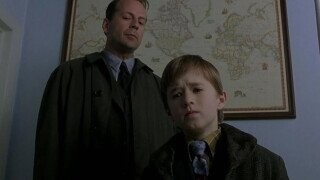20 Awful, Tired Tropes (and the Movies That Totally Pulled Them Off)

To cut a long story short, tropes are ways to cut a long story short, as in the phrase “to cut a long story short.” They’re visual, narrative, or structural cues used to transmit precise information by shorter, commonly-known means. Take for example one of our favorite trope-discussing meta movies: Funny Games. Early on, the camera focuses on a knife falling on the ground — Chekhov's knife, if you will, and we know you will. The movie does this because, at least unconsciously, viewers know that focusing on a random object at the beginning indicates the object will be used later on. Of course, in Funny Games the knife isn’t actually used, which makes it a subverted trope. This is not what we’re discussing today, but you get it. Yeah, you do. Look at you, grinning while saying “hell yeah! Random Funny Games references!” We know, we know.
Anyway, at least in fiction, and for better or worse, tropes tend to work. In real life, you can have someone spending decades giving off every single trope for slimy corruption and a giggling grandpa surrounded by chirping birds like a friggin’ Disney princess – and it’ll still be the former who will get to be president twice because the Controlled Opposition Party will do nothing after their purely symbolic hearings. Real life does not follow tropes. Instead, real life laughs chaotically in the face of their order-providing narrative function. Or come to think of it, perhaps real life is one big Michael Haneke movie. In any case, and just like singing, sentient animals in old-timey Disney movies, some tropes have managed to work wonderfully. In this Pictofact, we discuss awful, trite, and tired tropes that have been nevertheless pulled off in awesome ways, whether by the movies that invented them or by later ones that made great use of them. To cut a long story short, cutting a long story short can do wonders – Chekhov's trope, if you will.
Deus Ex Machina

Jump Scare

Goon Politeness

More: 6 Absurd Action Tropes You Never Noticed And Can't Unsee
Mexican Standoff

Getting Caught Was The Plan

Persona

The Discarded Image/YouTube
More: 5 Obnoxious Movie Trends You Can't Unsee
Edgy Song

Discarded Protection

More: 6 Absurd Action Tropes You Never Noticed And Can't Unsee
Office Misery

Source: WatchMojo.com/YouTube
Scanners

Terminator 2: Judgment Day

Movie Scene on YouTube
More: 6 Weirdly Specific Tropes Movies Got Briefly Obsessed With
Dangerous Woman

Source: Wikipedia
The Holy Mountain

Love Declaration

The Sixth Sense

Evil Children

Source: Wikipedia
Uncooperative Car

House Calls

Source: Screen Rant
Rock Bottom

Sky Beam

Movie Scene on YouTube
More: 6 Weirdly Specific Tropes Movies Got Briefly Obsessed With